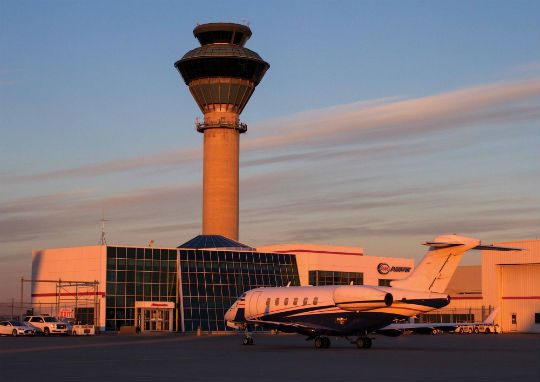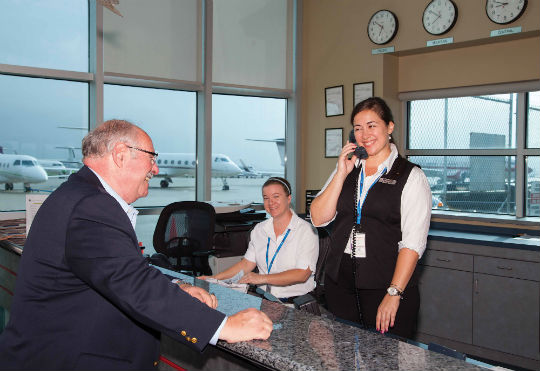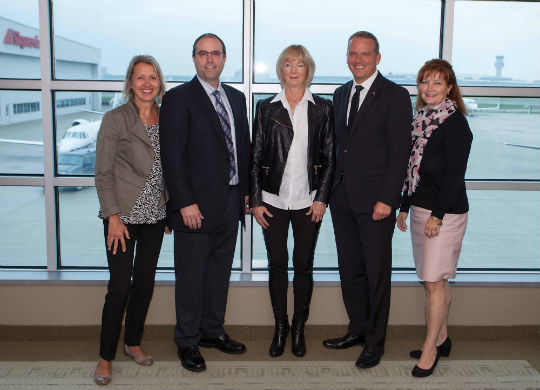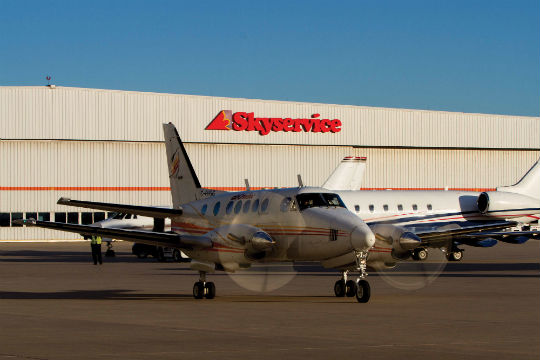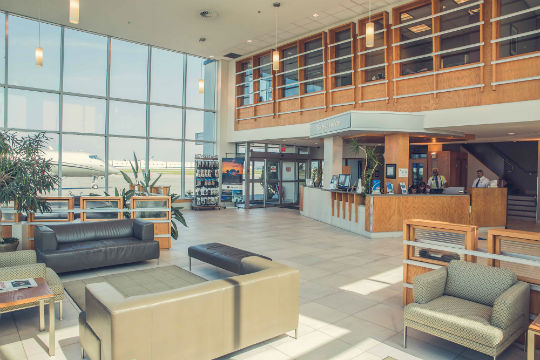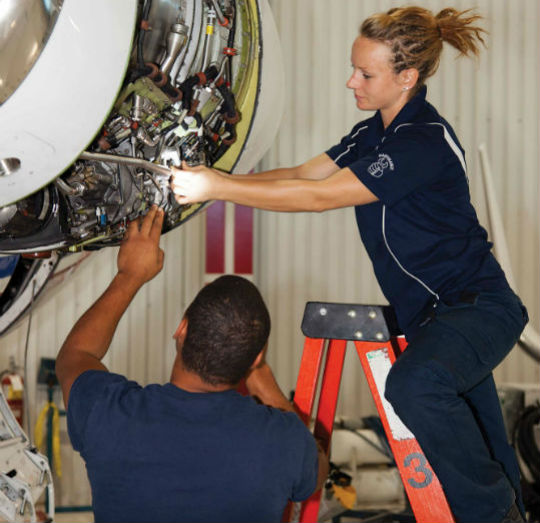Just another busy day on the ramp: Skyservice’s FBO facility sets it apart from its competitors, according to company president and CEO, Marshall Myles.
When Russ and Peggy Payson started Skyservice Business Aviation in Montreal back in 1986, they probably had no idea the company would grow into one of Canada’s biggest and most diverse fixed-base operators (FBOs).
Almost 30 years later, Skyservice is a fixture on the airfield in Montreal, and in Toronto and Calgary, too. The company’s activities span the breadth of business aviation services, including private aircraft management, charter sales, fuel and other FBO services, aircraft maintenance—including avionics, non-destructive testing (NDT), and regional airline service contracts—as well as pre-owned aircraft sales. Skyservice is also the exclusive Canadian dealer and service provider for the new HondaJet, which was expecting imminent U.S. Federal Aviation Administration certification at the time of writing.
It’s certainly a company that doesn’t believe in keeping all its eggs in one basket, or all its airplanes in one hangar, for that matter. In fact, the Skyservice team refers to the company’s many distinct business units as being “vertically integrated.”
“We’re very fortunate in that we can take care of the customer from beginning to end,” explained Lyn Shinn, who was hired to build the company’s Toronto aircraft charter business in 1999. According to Shinn, who is now vice president, central region, “We can manage the experience the customer has when they come through Skyservice.”
The company prides itself on delivering stellar service. It’s a culture that is promoted at all three bases, from the top all the way down to the most junior of the company’s 540 employees.
“All we are, everything about us, our DNA, is only about customer service and taking care of people,” said Skyservice president and CEO, Marshall Myles. “It’s all about the service.” He added that those values can be traced directly back to the founders, the Paysons, who are well-known members of the Canadian aviation community.
Myles assumed the role of president in 2008, before leading a group of private shareholders in buying out the original stakeholders, a process that was completed by 2012.
Close to half of Skyservice’s revenue is generated through its FBO group, which includes fuel sales, hangar rental, and aircraft services and supplies.
Diverse Operation
Close to half of Skyservice’s revenue is generated through its FBO group, which includes fuel sales, hangar rental, and aircraft services and supplies. The other half comes from a combination of the aircraft management and maintenance streams.
With 55 business aircraft and 25 different aircraft types currently on its operating certificate, the Skyservice fleet ranges in size from a Beechcraft King Air 200 up to an ultra-long range Bombardier Global 6000. Most are based in Montreal, Toronto or Calgary; however, Skyservice also manages a few aircraft in other locations, including Halifax, Ottawa, Windsor, Vancouver, and Kitchener.
In 2014, the company fleet logged a total of 15,220 flying hours, with about 40 per cent attributed to commercial charters and 60 per cent flown by private owners.
Skyservice offers those private owners a turn-key suite of aircraft management services. The company will handle regulatory details, provide flight crew from among its roster of 135 pilots and coordinate their training, deliver regular and specialized maintenance, and offer dispatch and flight following. Agreements are tailored to the individual needs of owners. Shinn said no detail is too small to merit the company’s full attention, from specific catering requests to ensuring that owners are served according to the highest standards of privacy and security. And, according to Myles, the addition of FBO-related services sets Skyservice apart from most of its Canadian competitors.
Customer service reps often greet customers by name.
That FBO component is set to grow following an announcement made in October 2014 at the National Business Aviation Association annual conference. British FBO giant BBA Aviation’s Signature Flight Support division announced it had signed a licensing agreement for Skyservice’s three locations. The arrangement will see the Skyservice FBOs taking on Signature branding, while retaining aircraft management, maintenance and charter services under its own name.
Although it’s been a year since the announcement, Myles said the rebranding has yet to occur. Signature has apparently been focused on finalizing some other transactions before transitioning Skyservice.
“Signature had quite a number of locations joining their system,” he told Skies. “They buy independents and chains, and convert them to Signature locations. Then, they started a licensing program several years ago, called Signature Select. You answer the phone and say ‘Signature’ but you’re still Skyservice, for example. It’s almost like being a McDonald’s franchisee instead of being a corporate store. This is the type of arrangement we’re looking to set up, one where we’ll still own our business, but we’ll appear as a full Signature location. It will be seamless.”
Myles said the arrangement should be in place and “signs should be up” by the spring of 2016. While Toronto and Calgary will be new airports for the Signature chain, Montreal is already served by Starlink Aviation, which is also a Signature affiliate. When asked how the two FBOs will handle the duplication, Myles admitted there will likely be some initial confusion, until pilots get used to requesting “Signature Skyservice” or “Signature Starlink.”
Maintenance Matters
While Lyn Shinn pointed out that aircraft charters are the “canary in the coal mine” in the sense that they are the first Skyservice business unit to feel economic ups and downs, she added that the company’s diversity sees it through. “Planes always need maintenance,” she added.
The Skyservice management team includes (L-R) Barbara Syrek, CFO; Paul Weeks, VP of Maintenance and Central Region; Lyn Shinn, VP of Business Development; Ian Wilson, VP of Marketing and Sales; Lyne Barbeau, VP Eastern Region.
That’s where Paul Weeks and his team come in. As VP of maintenance and central region, Weeks is an aircraft maintenance engineer (AME) who worked his way up through the company since he started in 1998. He is currently the person responsible for maintenance at Skyservice and oversees the work done at all three bases, as well as the FBO function, which includes linecrew, customer service representatives, and the facilities themselves. His maintenance team numbers 248 staff, with just over 200 of them being licensed AMEs.
Toronto is the biggest facility under Weeks’ supervision, with 160,000 square feet of hangar space. Next is Montreal, with 96,000 square feet, followed by the Calgary facility with 65,000 square feet.
The company delivers maintenance services to the managed fleet, its hangar tenants, and various airlines. Skyservice also provides on-call maintenance for regional jets in Toronto and Montreal, with the Calgary location handling aircraft turnaround services for U.S. airlines. It is a key supporter and partner of Sky Regional Airlines, and an authorized service and warranty centre for both Bombardier and Gulfstream.
“We tailor our services to whatever the customers wants,” said Weeks. “We have maintenance coordinators who look after a small group of planes. We also have it set up where the owner wants only a particular person to work on their plane.”
Skyservice recently expanded into pre-owned aircraft sales. It was a move that was driven by customer demand, according to VP Lyn Shinn.
Offsite work is handled by dedicated engineers at locations where there are aircraft, but no base. “They will perform minor maintenance and daily work, but the aircraft will come back to one of the bases for larger inspections, or perhaps it will go to the manufacturer,” noted Weeks.
About 25 per cent of the maintenance work performed by Skyservice is related to the managed fleet. The rest is spread out between airlines, avionics and NDT. Basically, the company handles everything but paint.
Economically speaking, the low Canadian dollar has been good for the Skyservice maintenance department. “We’ve been able to attract some U.S. and European business,” said Weeks. “We have a few European projects we’re doing in Montreal, and those are projects we wouldn’t have gotten if the dollar weren’t low.”
On the flip side, however, Shinn noted that the low dollar means the price of the HondaJet has gone up for Canadian buyers.
Growth Plan
While Toronto is indeed the largest location in the Skyservice chain, it is set to grow once again. Marshall Myles explained that the FBO is looking to make an even bigger impression in Ontario’s capital city.
Skyservice was established in Montreal nearly 30 years ago. Today, business is steady at the modern FBO base. Skyservice Photo
“We are looking at building a large new facility in Toronto,” he said. “There is a shortage of hangar space here. We’re planning a new build over the next couple of years, to add 200,000 square feet of hangar space and 40,000 square feet of office space to our existing facilities.”
Myles indicated the new building is in the planning stages right now, with Skyservice working with the Greater Toronto Airports Authority to finalize arrangements.
In terms of the company’s other locations, he reported that oil and gas industry turmoil has affected the bottom line in Calgary; however, business remains steady with renovations underway and the facility nearing full capacity.
Further east in Montreal, business is very stable, with that base operating at full capacity with only a touch of room left for growth.
As Myles looks ahead to the next couple of years, his priorities are three-fold: implement the Signature agreement, launch the HondaJet in Canada, and construct the new building in Toronto. As for the FBO industry itself, he notes that there is a lot of consolidation underway and he expects the business landscape to look very different in the coming years.
“There are likely too many FBOs out there now, and they all have different standards,” said Myles. “I think the FBO industry is a mixed bag these days, but that will change with the consolidation I mentioned. Standards are rising now, and will continue to rise.”
About 25 per cent of the maintenance work performed by Skyservice is related to the managed fleet. The rest is spread out between airlines, avionics and NDT.
Lyn Shinn agrees that the industry is changing. “I think going forward, there will be a natural amalgamation of companies,” she predicted. “Aviation is so complex. It’s very difficult for small organizations without the resources to really keep up with changes in aviation information. Also, I think there are a lot of very experienced pilots running private flight departments, and I’m not sure there are people behind them who want to take over.”
She added that overall, she also expects the aviation industry to see a shortage of experienced pilots over the next few years.
Weeks reported that on the maintenance side, it is becoming more difficult to locate personnel with experience in specialized areas, such as avionics and sheet metal. That’s why the company is also focused on retaining current talent as well as recruiting new staff.
Bright Future
As planning gets underway for Skyservice’s 30th anniversary celebrations next June, Lyn Shinn reflected on the company’s staying power.
“I think it has to do with being able to provide the customer service, but that’s only part of it,” she said. “A company needs to be able to anticipate the market, be ahead of the market, and be agile to make changes. I think that’s something we’re very successful at doing.”
For instance, she explained that Skyservice recently expanded into pre-owned aircraft sales. It was a move that was driven by customer demand. “A lot of our charter customers were coming to us for advice on what to buy,” Shinn explained. “We realized we were doing a lot of research for them. We look at their profile and mission, and how many hours they will put on, and their budget. When we sell an aircraft to a customer, we’re married to that customer. It’s not like we’re just dating them. We know we want them as long-term customers.”
Skyservice provides a full range of turn-key services for aircraft owners, including professional dispatch and flight following services.
While the Skyservice name represents a strong brand in Canada, there are still opportunities to further reinforce that good name. That’s where Ian Wilson, the company’s new VP, sales and marketing, comes in. As a relative newcomer to Skyservice—he had been there for three months at the time of writing—Wilson brings a fresh perspective and a goal to build awareness across each of the company’s business units.
“On the sales side of things, we’re constantly looking for new opportunities for growth,” said Wilson. “Our objective is to continue to grow and offer a vertically integrated service that can support customers from end to end, without relying on third-party service providers.”
He intends to drive growth through marketing, while establishing a strong sales component to support increased demand. “The customer comes to us with so much information these days. The sales staff must be highly trained and provide information in a way that shows integrity and depth of knowledge.”
Wilson said he’ll be evaluating the role technology plays in promoting Skyservice and its offerings. “First, we need to understand our position in the marketplace and then communicate our value to our customers.”
On Oct. 1, Skyservice launched a revamped website that is designed to do just that, by simplifying client interactions and making the business easy to understand.
As Myles noted, the company’s future looks bright. “The future is very exciting for us. We have 30 years of heritage, and I’m proud to be here and come to work every day. We have an incredible, amazing, dedicated, loyal team of people, and that’s what makes us who we are—we’re engaged.”
Lisa Gordon is editor-in-chief of MHM Publishing’s Skies magazine.

